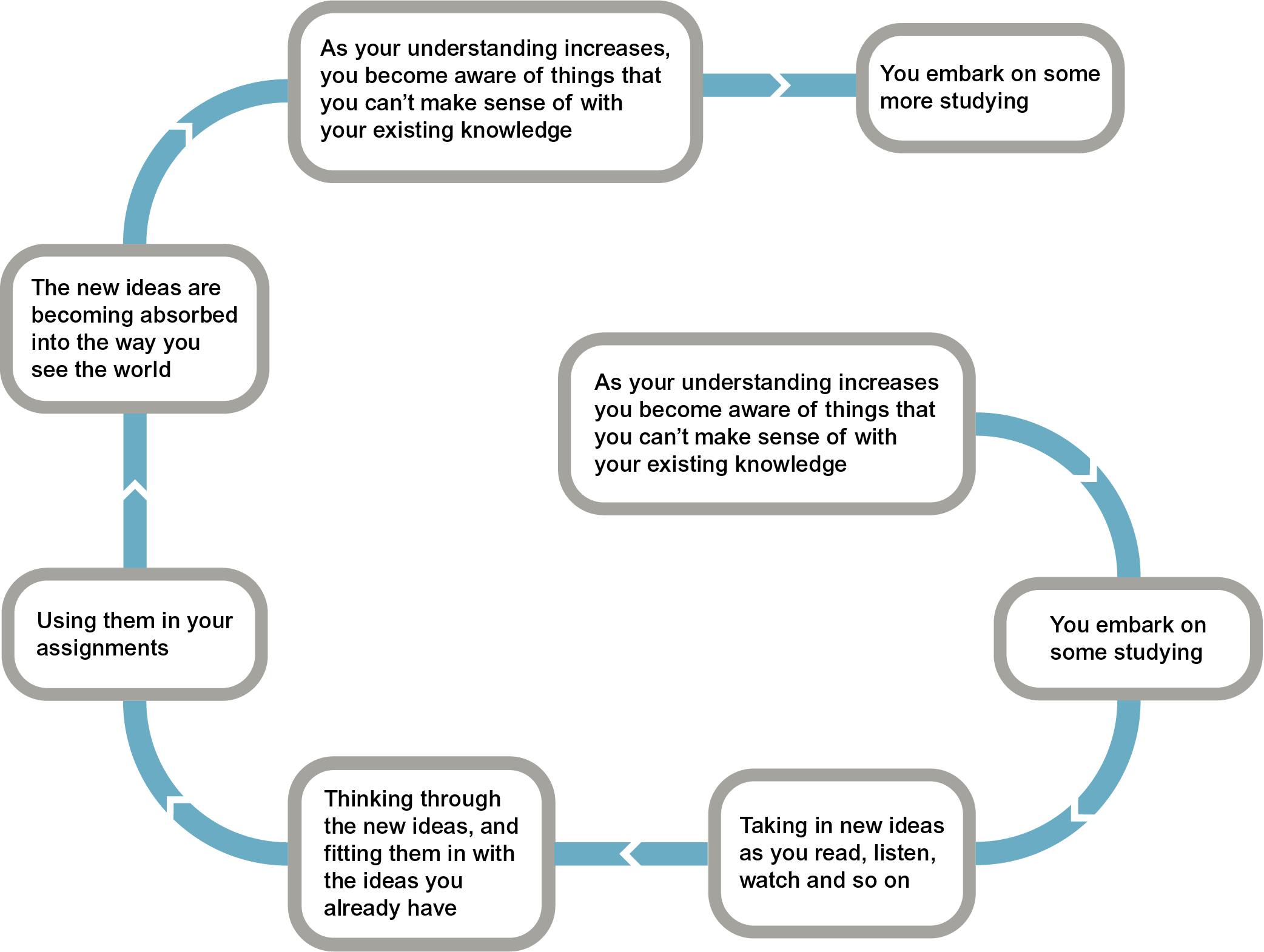Review your progress Strategic study techniques
It can be useful to think of learning as an ongoing process in which you advance your understanding step by step. Imagine your learning as a spiral starting with increasing your understanding and becoming aware of things you can't make sense of with your existing knowledge, then embarking on some studying. You'll take in new ideas as you read, listen, watch and so on. You'll think through the new ideas, fitting them in with the ideas you already have and using them in assignments. The new ideas will become absorbed into the way you see the world. You'll then begin to increase your understanding and become aware of more things you can't make sense of and embark on more studying. As you follow the spiral you realise that the ideas you once had difficulty grasping are now clear, and you want to move on to take in new ideas and think them through.

Having an appreciation of this process helps you to accept that you may not understand everything at first and you need to continue developing your skills throughout your study. For example, modules at higher levels assume you have the basic study skills and focus on developing more advanced skills such as analysis, critique and judgement. If you go on to take a postgraduate qualification you'll find that presentation skills are required. In addition, you'll be expected to have the skills to read and assimilate research papers and even design your own research.
At the start of your studies
As you begin your module, you should think about why you have chosen the module and what you want to achieve, and identify any skills that you need to do well in it.
Each subject requires the development of particular cognitive processing skills. For example, you may need the ability to construct an objective argument in a social sciences assignment.
Making a record of your thoughts and aims at this stage gives you something to look back on and may help you to devise coping strategies if study gets tough. It's also a useful resource for later when you want to review your aims and monitor your progress. Think about these points:
- Why did you choose the subject?
- What did you hope to achieve?
- Did you have any concerns about studying?
You can use this module-start review form (DOCX, 94KB). Here is a completed example: Jon's module start review (DOCX, 93KB).
When you first receive your study materials and look at the study schedule you may feel overwhelmed by the quantity and variety of different tasks. To manage your time and maintain your motivation, it's important to take stock of what you need to do. Devising a strategy can help you to plan ahead. This involves:
- clarifying specific goals - deciding what you want to do, when and how
- completing study tasks such as making use of print and electronic resources, or meeting deadlines for assignments
- thinking about what you're doing effectively and monitoring your progress
- reflecting on how you're learning as well as what you are learning.
At the mid-point of your studies
Do some critical thinking at this point by acknowledging your strengths and weaknesses, and make some positive and constructive plans. If you want to know how you've done in your marks so far, find out about estimating your module results. Ask yourself the following questions:
- How far have you achieved what you wanted from your studies?
- Are there any parts of the module materials that you're worried about?
- Are there any study strategies that you need to improve or change?
- Any action points?
Consider using this mid-module review form (DOCX, 93KB) to compare your plans to the review form you completed earlier. This is a completed example Jon's mid-module review (DOCX, 94KB).
At the end of your studies
Towards the end of your module take a few minutes to think about where you are with your study. Reviewing your study so far will help you to:
- think about what you've gained from your module
- consider how this will be useful for the future
- note down any study strategies or techniques you want to change in future study
- find out about general assessment and exam matters.
To help you prioritise, work through this end-of-module checklist. You can keep this in your study folder and refer back to it when you're preparing to study your next module.